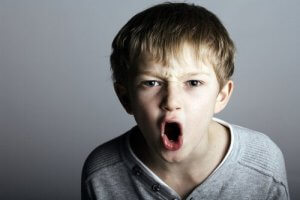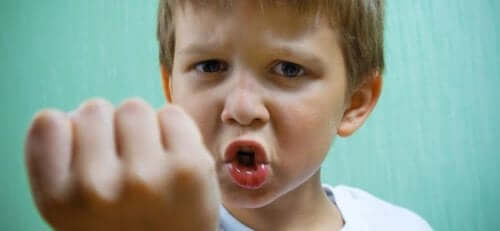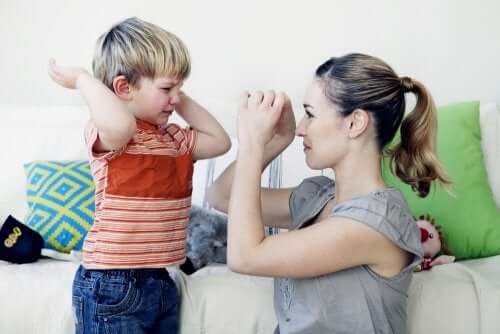Aggressive Behaviors in Children

Many parents and teachers have a hard time controlling aggressive behaviors in children. One of the possible reasons why this happens is that, simply, the causes of these behaviors are ignored.
On the other hand, it’s true that some adults, simply out of convenience, let these episodes slide. They do so regardless of the future consequences that such behaviors can have for the child.
Aggressive behaviors in children usually don’t start naturally or suddenly. Instead, they have specific causes. An example of this may be the child’s temperament or the influence of the environment where they operate. It’s amazing how easily aggressive behaviors in children manifest and the lack of tools parents and educators have to deal with them.
Physically mistreating their peers, offending them, taunts, temper tantrums, using inadequate words to address others, and drawing attention at all costs out of whims are common examples of aggressive behaviors in children.
Why do aggressive behaviors manifest in children?
Although it may seem strange, childhood aggression is normal in child development in low-impact, controlled manifestations. In this regard, it’s common for people to see children take their or their classmates’ toys and kick them, throw them to the floor, or hit them.
During their development, children are constantly developing their cognitive and social skills. This is a new challenge for children and, if they feel they can’t do it, they may lash out at the person who’s closest to them. Frustration in aggressive children is the main cause of their violent outbursts.

Whatever encourages aggressive behaviors in children is likely to be overcome as they develop their comprehension and language to solve the difficulties or challenges that they’ll have to face in life.
The important thing is for parents to be calm and have enough temperance to be able to stay in control of the situation and apply relevant corrective measures.
Causes of aggressive behaviors in children
Home discipline
The family is the first and most important social group where the child is included. In this group, they learn the basic rules of coexistence and universal values from an early age. If their upbringing is undemanding or too rigid, this may encourage aggressive behaviors.
Childhood aggression is also influenced by behavior patterns that children receive from their parents. Children usually imitate what they see at home. Thus, if they live in a hostile environment, they’ll adopt that model and repeat those attitudes as their main responses.
Organic factors
Other causes that modify behavior aggressively are organic in nature. Some examples are hormonal unbalance, nutritional deficiency, and alteration of brain mechanisms, such as the frontal lobes, which make behavior vary and become violent.
Difficulty with social skills
Not all children are able to develop skills to fit into a social group. Most of the time, this may trigger a tendency to respond violently.
If children feel frustrated and misunderstood, they’ll seek ways to blow off steam and will most likely do it aggressively.
How to react to aggressive behaviors in children
Exercise restraint
It’s important to avoid physically and verbally abusing a child. The best way to teach children to modify aggressive behaviors is by example.
Although it may seem very difficult, parents should try to exercise restraint, breathe deeply, and show their children that physical or verbal aggression isn’t the solution.
Immediate response
When the child has an outburst, it’s best to respond quickly. You should talk to them and make them understand that what they’re doing is wrong and that those behaviors have consequences.
The restrictions that parents may apply after each of these episodes, such as reducing TV time, taking away their favorite toys, or not letting them go out and play, will eventually yield good results.
Reinforce good behavior
Just as you reprimand them for their outbursts and aggressive attitudes, you also have to equally reinforce their positive behaviors and any trace of response modifications to situations where they usually responded with aggression.

Recognizing their achievements and good behavior will open the right path to self-control of behavioral responses.
Modifying aggressive behaviors in children is a task for all family members. The key to this is unity and teamwork. In addition, parents should remember that perseverance, patience, and discipline will help change these behaviors little by little.
Many parents and teachers have a hard time controlling aggressive behaviors in children. One of the possible reasons why this happens is that, simply, the causes of these behaviors are ignored.
On the other hand, it’s true that some adults, simply out of convenience, let these episodes slide. They do so regardless of the future consequences that such behaviors can have for the child.
Aggressive behaviors in children usually don’t start naturally or suddenly. Instead, they have specific causes. An example of this may be the child’s temperament or the influence of the environment where they operate. It’s amazing how easily aggressive behaviors in children manifest and the lack of tools parents and educators have to deal with them.
Physically mistreating their peers, offending them, taunts, temper tantrums, using inadequate words to address others, and drawing attention at all costs out of whims are common examples of aggressive behaviors in children.
Why do aggressive behaviors manifest in children?
Although it may seem strange, childhood aggression is normal in child development in low-impact, controlled manifestations. In this regard, it’s common for people to see children take their or their classmates’ toys and kick them, throw them to the floor, or hit them.
During their development, children are constantly developing their cognitive and social skills. This is a new challenge for children and, if they feel they can’t do it, they may lash out at the person who’s closest to them. Frustration in aggressive children is the main cause of their violent outbursts.

Whatever encourages aggressive behaviors in children is likely to be overcome as they develop their comprehension and language to solve the difficulties or challenges that they’ll have to face in life.
The important thing is for parents to be calm and have enough temperance to be able to stay in control of the situation and apply relevant corrective measures.
Causes of aggressive behaviors in children
Home discipline
The family is the first and most important social group where the child is included. In this group, they learn the basic rules of coexistence and universal values from an early age. If their upbringing is undemanding or too rigid, this may encourage aggressive behaviors.
Childhood aggression is also influenced by behavior patterns that children receive from their parents. Children usually imitate what they see at home. Thus, if they live in a hostile environment, they’ll adopt that model and repeat those attitudes as their main responses.
Organic factors
Other causes that modify behavior aggressively are organic in nature. Some examples are hormonal unbalance, nutritional deficiency, and alteration of brain mechanisms, such as the frontal lobes, which make behavior vary and become violent.
Difficulty with social skills
Not all children are able to develop skills to fit into a social group. Most of the time, this may trigger a tendency to respond violently.
If children feel frustrated and misunderstood, they’ll seek ways to blow off steam and will most likely do it aggressively.
How to react to aggressive behaviors in children
Exercise restraint
It’s important to avoid physically and verbally abusing a child. The best way to teach children to modify aggressive behaviors is by example.
Although it may seem very difficult, parents should try to exercise restraint, breathe deeply, and show their children that physical or verbal aggression isn’t the solution.
Immediate response
When the child has an outburst, it’s best to respond quickly. You should talk to them and make them understand that what they’re doing is wrong and that those behaviors have consequences.
The restrictions that parents may apply after each of these episodes, such as reducing TV time, taking away their favorite toys, or not letting them go out and play, will eventually yield good results.
Reinforce good behavior
Just as you reprimand them for their outbursts and aggressive attitudes, you also have to equally reinforce their positive behaviors and any trace of response modifications to situations where they usually responded with aggression.

Recognizing their achievements and good behavior will open the right path to self-control of behavioral responses.
Modifying aggressive behaviors in children is a task for all family members. The key to this is unity and teamwork. In addition, parents should remember that perseverance, patience, and discipline will help change these behaviors little by little.
All cited sources were thoroughly reviewed by our team to ensure their quality, reliability, currency, and validity. The bibliography of this article was considered reliable and of academic or scientific accuracy.
- Garaigordobil Landazabal, M. (2004). Intervención psicológica en la conducta agresiva y antisocial con niños. Psicothema, 16(3). https://www.redalyc.org/html/727/72716315/
- Noroño Morales, N. V., Cruz Segundo, R., Cadalso Sorroche, R., & Fernández Benítez, O. (2002). Influencia del medio familiar en niños con conductas agresivas. Revista cubana de Pediatria, 74(2), 138-144. http://scielo.sld.cu/scielo.php?script=sci_arttext&pid=S0034-75312002000200007
- Verona, J. A. G., Pastor, J. F., De Paz, F., Barbosa, M., Macías, J. A., Maniega, M. A., … & Picornell, I. (2002). Psicobiología de las conductas agresivas. Anales de Psicología/Annals of Psychology, 18(2), 293-303. https://revistas.um.es/analesps/article/view/28511
This text is provided for informational purposes only and does not replace consultation with a professional. If in doubt, consult your specialist.








